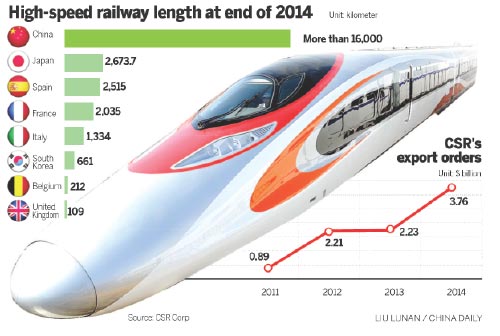
An increasing number of Chinese companies are emerging on the world stage as they strive to establish their brands outside the country.
Xiao Liang, a machinery worker in his mid-30s who lives in the eastern coastal city of Qingdao, Shandong province, wants to visit all the famous places served by trains that pass through his city.
But that list gets longer all the time as the rail network expands.
"When I was a student, getting to Beijing was an overnight trip. Now, it's less than five hours, and I've read that by 2018, it will take only half that time. That's unbelievable!" he said.
China has more than 60 percent of the world's high-speed railways, with a network covering more than 16,000 km as of the end of 2014, according to official figures.
The rapid development of the high-speed rail network has brought vast changes to life in China, making it easier and more affordable for many people to get around the country. And the rapid trips are set to get even faster.
CSR Corp Chairman Zheng Changhong said that his company has designed a prototype high-speed train that runs at a test speed of up to 500 km per hour.
"We're testing state-of-the-art technologies in this field and preparing for the next generation of high-speed trains," said Zheng.
CSR's current product portfolio covers high-speed trains that run up to 380 km per hour, as well as other rolling stock such as subways, trams and locomotives.
"Our products have passed rigorous tests in extreme weather and various environments ... deserts, very low temperatures and high altitudes. That gives us a competitive edge," said Zheng.
Compared with international competitors, Chinese train producers have a clear advantage in terms of cost, delivery time, manufacturing capacity and complete product portfolio, he said.
The high-speed rail network is a "calling card" for China, as the country is upgrading its industrial base and restructuring its economy to focus on sectors that generate higher added value.
Premier Li Keqiang has played the role of salesman for the high-speed train sector, promoting the technology to about a dozen countries in the past two years, said Zheng.
When Li makes an overseas visit, one of the gifts he gives is a model of the CHR 380A, a high-speed, multiple-unit train manufactured by CSR Qingdao Sifang Co. Nearly half of the high-speed trains in China are manufactured by Sifang.
The company had hoped to build a high-speed rail line linking Mexico City with the industrial hub of Queretaro, and it made enormous efforts to win the deal, only to see the bidding suspended by the Mexican government.
Ma Qiang, a manager at Sifang's overseas department, said that the company has exported its products to more than 20 countries, and still believes there are "great opportunities" in the overseas market.
It won a $1 billion contract to provide an intercity train to Argentina in 2013. The first 54 cars have already gone into service in Buenos Aires, capital of Argentina. Ma said that last month, Sifang dispatched more than 30 staff to Argentina, where it is providing technical support and training under the terms of the contract.
"That means our 'going out' program has moved from just providing products to a combination of products, services and technologies," said Ma.
CSR won $3.76 billion in overseas orders in 2014, up 68.6 percent from the previous year, the company said.
It is pursuing a Thai railway project as well as a high-speed project linking Singapore and Malaysia, he said.
"CSR has established closer trade ties with the related countries and we will spare no effort in promoting the 'going out' strategy," he added.